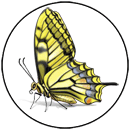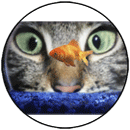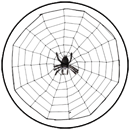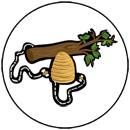Butterfly
Changing and Learning, or ‘growth orientation’.
 Effective learners know that learning itself is learnable. They believe that, through effort, their minds can get bigger and stronger, just as their bodies can and they have energy to learn. They see learning as a lifelong process, and gain pleasure and self-esteem from expanding their ability to learn. Having to try is experienced positively:
Effective learners know that learning itself is learnable. They believe that, through effort, their minds can get bigger and stronger, just as their bodies can and they have energy to learn. They see learning as a lifelong process, and gain pleasure and self-esteem from expanding their ability to learn. Having to try is experienced positively:
it’s when you are trying that your ‘learning muscles’ are being exercised. A growth orientation includes a sense of getting better at learning over time, and of growing and changing and adapting as a learner in the whole of life. There is a sense of history and hope. The contrast pole of growth orientation is fixity, or being stuck and static. Less effective learners tend to believe that ‘learning power’ is fixed, and therefore experience difficulty negatively, as revealing their limitations. They are less likely to see challenging situations as opportunities to become a better learner.
Cat
Critical curiosity.
 Effective learners have energy and a desire to find things out. They like to get below the surface of things and try to find out what is going on. They value ‘getting at the truth’, and are more likely to adopt ‘deep’ rather than ‘surface’ learning strategies. They are less likely to accept what they are told uncritically, enjoy asking questions, and are more willing to reveal their questions and uncertainties in public. They like to come to their own conclusions about things, and are inclined to see knowledge, at least in part, as a produce of human inquiry. They take ownership of their own learning and enjoy a challenge. The contrast pole is passivity. Passive learners are more likely to accept what they are told uncritically, and to believe that ‘received wisdom’ is necessarily true. They are less thoughtful, and less likely to engage spontaneously in active speculation and exploratory kinds of discussion.
Effective learners have energy and a desire to find things out. They like to get below the surface of things and try to find out what is going on. They value ‘getting at the truth’, and are more likely to adopt ‘deep’ rather than ‘surface’ learning strategies. They are less likely to accept what they are told uncritically, enjoy asking questions, and are more willing to reveal their questions and uncertainties in public. They like to come to their own conclusions about things, and are inclined to see knowledge, at least in part, as a produce of human inquiry. They take ownership of their own learning and enjoy a challenge. The contrast pole is passivity. Passive learners are more likely to accept what they are told uncritically, and to believe that ‘received wisdom’ is necessarily true. They are less thoughtful, and less likely to engage spontaneously in active speculation and exploratory kinds of discussion.
Spider
Meaning Making.
 Effective learners are on the lookout for links between what they are learning and what they already know. They get pleasure from seeing how things ‘fit together’. They like it when they can make sense of new things in terms of their own experience, and when they can see how learning relates to their own concerns. Their questions reflect this orientation towards coherence. They are interested in the big picture and how the new learning fits within it. They like to learn about what really matters to them. The contrast pole is fragmentation. Less effective learners are more likely to approach learning situations piecemeal, and to respond to them on their own individual merits. They may be more interested in knowing the criteria for successful performance than in looking for joined-up meanings and associations.
Effective learners are on the lookout for links between what they are learning and what they already know. They get pleasure from seeing how things ‘fit together’. They like it when they can make sense of new things in terms of their own experience, and when they can see how learning relates to their own concerns. Their questions reflect this orientation towards coherence. They are interested in the big picture and how the new learning fits within it. They like to learn about what really matters to them. The contrast pole is fragmentation. Less effective learners are more likely to approach learning situations piecemeal, and to respond to them on their own individual merits. They may be more interested in knowing the criteria for successful performance than in looking for joined-up meanings and associations.
Fish
Dependence and Fragility.
 Dependent and Fragile learners more easily go to pieces whey they get stuck or make mistakes. They are risk averse. Their ability to persevere is less, and they are likely to seek and prefer less challenging situations. They are dependent upon other people and external structures for their learning and for their sense of self-esteem. They are passive imbibers of knowledge, rather than active agents of their own learning constructing meaning from their experience. The contrast pole for dependence is resilience and robustness. Effective learners like a challenge, and are willing to ‘give it a go’ even when the outcome and the way to proceed are uncertain. They accept that learning is sometimes hard for everyone, and are not frightened of finding things difficult. They have a high level of ‘stickability’, and can readily recover from frustration. They are able to ‘hang in’ with learning even though they may, for a while, feel somewhat confused or even anxious. They don’t mind making mistakes every so often, and can learn from them.
Dependent and Fragile learners more easily go to pieces whey they get stuck or make mistakes. They are risk averse. Their ability to persevere is less, and they are likely to seek and prefer less challenging situations. They are dependent upon other people and external structures for their learning and for their sense of self-esteem. They are passive imbibers of knowledge, rather than active agents of their own learning constructing meaning from their experience. The contrast pole for dependence is resilience and robustness. Effective learners like a challenge, and are willing to ‘give it a go’ even when the outcome and the way to proceed are uncertain. They accept that learning is sometimes hard for everyone, and are not frightened of finding things difficult. They have a high level of ‘stickability’, and can readily recover from frustration. They are able to ‘hang in’ with learning even though they may, for a while, feel somewhat confused or even anxious. They don’t mind making mistakes every so often, and can learn from them.
Monkey
Creativity.
 Effective learners are able to look at things in different ways and to imagine new possibilities. They like playing with ideas and taking different perspectives. They like playing with ideas and taking different perspectives, even when they don’t quite know where their trains of thought are leading. They are more receptive to hunches and inklings that bubble up into their minds, and make more use of imagination, visual imagery and pictures and diagrams in their learning. They understand that learning often needs playfulness as well as purposeful, systematic thinking. The contrast pole is literalness or rule-boundness. Less effective learners tend to be unimaginative. They prefer clear-cut information and tried-and-tested ways of looking at things, and they feel safer when they know how they are meant to proceed. They function well in routine problem-solving situations, but are more at sea when greater creativity is required.
Effective learners are able to look at things in different ways and to imagine new possibilities. They like playing with ideas and taking different perspectives. They like playing with ideas and taking different perspectives, even when they don’t quite know where their trains of thought are leading. They are more receptive to hunches and inklings that bubble up into their minds, and make more use of imagination, visual imagery and pictures and diagrams in their learning. They understand that learning often needs playfulness as well as purposeful, systematic thinking. The contrast pole is literalness or rule-boundness. Less effective learners tend to be unimaginative. They prefer clear-cut information and tried-and-tested ways of looking at things, and they feel safer when they know how they are meant to proceed. They function well in routine problem-solving situations, but are more at sea when greater creativity is required.
Bee
Learning Relationships/Interdependence.
 Effective learners are good at managing the balance between sociable and being private in their learning. They are not completely independent, nor are they dependent. They like to learn with and from others, and to share their difficulties, when it is appropriate. They acknowledge that there are important other people in their lives who help them learn, though they may vary in who those people are, e.g. family, friends or teachers. They know the value of learning by watching and emulating other people, including their peers. They make use of others as resources, as partners and as sources of emotional support. And they also know that effective learning may also require times of studying – or ‘dreaming’ – on their own. The contrast pole we might call isolation or dependence. Less effective learners are more likely to be stuck either in their over-dependency on others for reassurance or guidance; or in their lack of engagement with other people.
Effective learners are good at managing the balance between sociable and being private in their learning. They are not completely independent, nor are they dependent. They like to learn with and from others, and to share their difficulties, when it is appropriate. They acknowledge that there are important other people in their lives who help them learn, though they may vary in who those people are, e.g. family, friends or teachers. They know the value of learning by watching and emulating other people, including their peers. They make use of others as resources, as partners and as sources of emotional support. And they also know that effective learning may also require times of studying – or ‘dreaming’ – on their own. The contrast pole we might call isolation or dependence. Less effective learners are more likely to be stuck either in their over-dependency on others for reassurance or guidance; or in their lack of engagement with other people.
Owl
Strategic Awareness.
 More effective learners know more about their own learning. They are interested in becoming more knowledgeable and more aware of themselves as learners. They like trying out different approaches to learning to see what happens. They are more reflective and better at self-evaluation. They are better at judging how much time, or what resources, a learning task will require. They are more able to talk about learning and about themselves as learners. They know how to repair their own emotional mood when they get frustrated or disappointed. They like being given responsibility for planning and organising their own learning. The contrast to this is ‘strategic’ is robotic. Less effective learners are less self-aware, and are more likely to confuse self awareness and self-consciousness.
More effective learners know more about their own learning. They are interested in becoming more knowledgeable and more aware of themselves as learners. They like trying out different approaches to learning to see what happens. They are more reflective and better at self-evaluation. They are better at judging how much time, or what resources, a learning task will require. They are more able to talk about learning and about themselves as learners. They know how to repair their own emotional mood when they get frustrated or disappointed. They like being given responsibility for planning and organising their own learning. The contrast to this is ‘strategic’ is robotic. Less effective learners are less self-aware, and are more likely to confuse self awareness and self-consciousness.